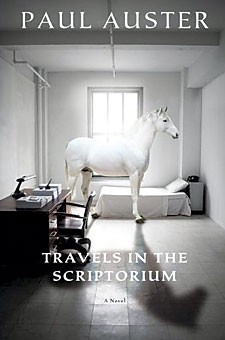Paul Auster’s novel, “”Travels in the Scriptorium”” sets itself apart from other new releases of the month with its intriguing first impressions. The strange white horse on the cover, the sinister surveillance equipment mentioned in the blurb and, of course, the question “”What on Earth is a ‘scriptorium’?”” all add to the initial mystery.
We are given only the bare minimum in terms of character and setting.
The protagonist is an old man who lacks a proper name and is thus referred to as Mr. Blank. His memory is shot, so there is no chance of us getting an explanation from him. He cannot even remember the people who visit him during the day but has a strong feeling of guilt when he sees them.
Mr. Blank is too weak to leave his room, too weak even to find out if the door is locked. His room is minimal and non-descript; the one window is locked firmly shut.
Throughout the novel, the mystery of who Mr. Blank is and why he is in that room is drawn out. We are given hints that the narrator is a character watching Mr. Blank through surveillance cameras. We are left guessing as to whether Mr. Blank is a captive.
Dangerous “”missions,”” a series of unexplained medical treatments and the manuscript Mr. Blank finds, are all clues placed as if “”Travels”” were a detective novel, yet the reader is responsible for piecing together the evidence.
Auster seems to be examining the process of writing in a rather introverted and meta-fictional trip inside an author’s mind.
Mr. Blank’s visitors seem to feel the tenderness and indignation toward him that one would imagine fictional characters feeling for the man that wrote them. Interestingly, many of the visitors that appear as guests of Mr. Blank are characters from previous Auster works.
The language Auster uses reads smoothly, and since there is very little description, no excessive adjectives clog up the prose. If taken purely at face value, the novel is simply a day in the life of a man who has lost his memory. However, the story’s concept requires more reader-scrutiny than the average book.
If you need a strong plot or a lot of action to stay interested in a book, give this one a miss. This novel is as much about how a book is written as it is a story, promising a complex and engaging puzzle for those interested in the theory of writing and such questions as how much responsibility an author has for his characters.
Fans of Samuel Beckett’s classic play “”Waiting for Godot”” will delight in the fact that “”Travels in the Scriptorium”” leaves the reader waiting for the length of the book and beyond.









